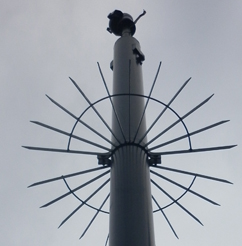CCTV operators may adopt an ‘accuracy over speed’ approach when viewing potentially suspicious behaviour, new research has suggested. The Nottingham Trent University study, being published in the journal Frontiers in Human Neuroscience, involved monitoring the suspiciousness of CCTV operators while tracking their eye movements.
The research, which included researchers from the University of Bristol and University of Leeds, suggests that operators may be able to anticipate potential trouble, and trouble hotspots, very quickly – and adopt a brief two second delay before making a judgement.
This waiting strategy allows them to process more visual information, and may be a deliberate tactic to help them make an accurate decision and minimise the number of false alarms, the study suggests.
Operators were shown 80 one minute clips of recorded footage depicting a variety of urban scenes, such as a night-time view of a car park, a shopping street underpass, a nightclub entrance and a cashpoint. They were asked to monitor the scenes for behaviour deemed suspicious enough to alert the relevant authorities and used a joystick to indicate the perceived level of suspicious behaviour. At the same time the relationship between these ratings and the operators’ patterns of gaze were being measured using eye tracking equipment. The results were compared against a group of untrained observers.
The study found that trained operators took slightly longer than untrained observers when deciding to label whether a scene is suspicious.
The data also suggests that trained operators, all from the Manchester City Council control room, moved their eyes to the relevant part of the scene earlier, and their gaze followed very similar viewing patterns. They would glance to specific areas of focus rather than flit between random locations as was the case with untrained operators and were also much more consistent at spotting suspicious events in ambiguous footage.
A researcher Dr Christina Howard, a psychologist in Nottingham Trent University’s School of Social Sciences said: “It appears that CCTV operators choose to undertake additional visual processing to reduce ambiguity and help them to reach an accurate decision. In safety and security situations where quick and accurate judgements are critical to public safety, this is clearly of huge importance. CCTV systems are becoming increasingly sophisticated, but very little is known about the behaviour and expertise of those who monitor and respond to events in control rooms.
“It’s possible that our findings could be used to develop more effective training methods for CCTV operators.”
Notes
Article title: Suspiciousness perception in dynamic scenes: a comparison of CCTV operators and novices
Journal: Frontiers in Human Neuroscience:
DOI: 10.3389/fnhum.2013.00441
The article can be viewed here: http://www.frontiersin.org/Human_Neuroscience/10.3389/fnhum.2013.00441/abstract










